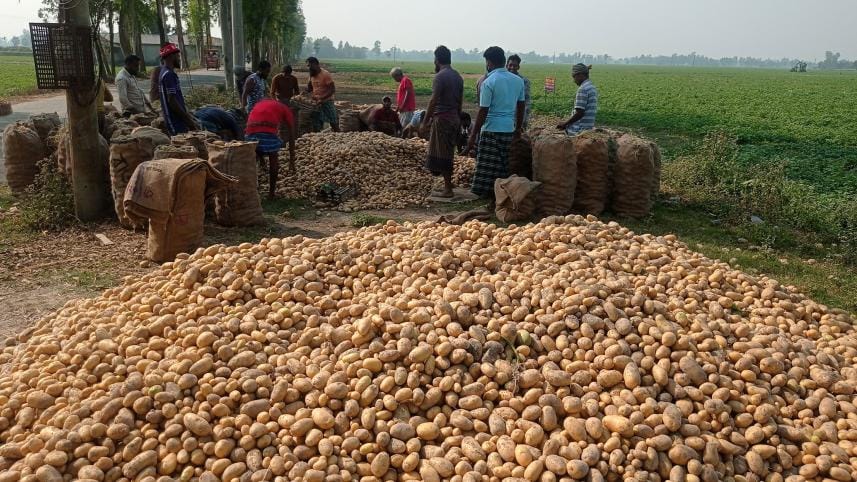Potato farmers hold back stock as prices crash

With wholesale potato prices tumbling to a record low of Tk 8 per kilogramme — barely half the production cost — farmers are refusing to release their stored produce. The reluctance has sparked fears of a severe glut and mounting losses for growers, with storage contracts set to expire next month.
Many farmers are also cutting back on new cultivation, raising concern over a possible shortage next year.
Bangladesh produced a record 1.15 crore tonnes of potatoes last season, far exceeding annual domestic demand of around 90 lakh tonnes, according to the Bangladesh Bureau of Statistics (BBS). That bumper harvest has now turned into a burden as the government did almost nothing to stop the price fall or help the growers.
MOUNTING LOSSES
Farmers usually store their potatoes for about six months, hoping for higher prices later. But when that period ends, on November 15 this year, ownership of any unsold stock will pass to cold storage owners.
"The market price has dropped to Tk 8-Tk 10 per kg, so farmers are simply not releasing their stock," said Moshiur Rahman, managing director of Gobindaganj Cold Storage Limited in Gaibandha. "Out of 20,000 tonnes stored in our two facilities, only 3,000 tonnes have been withdrawn so far. By this time last year, over twice that amount had been released."
At Himadri Limited, another cold storage in Gobindaganj, only 40,000 of 1.2 lakh stored bags had been withdrawn by September 13, compared with 70,000 bags last year, said manager Mozammel Hoque.
The Bangladesh Cold Storage Association (BCSA) reported that 21.79 lakh tonnes of potatoes were preserved across 340 cold storages nationwide as of September 30 — 12.5 lakh tonnes of table potatoes, 9.13 lakh tonnes of seed potatoes, and the rest for industrial use.
Farmers say selling at current prices would mean incurring huge losses. The Department of Agricultural Extension (DAE) estimates the production cost in northern districts, which account for around 80 percent of total production, at Tk 14.5-Tk 16 per kg.
"I spent Tk 45,000 on one bigha and harvested 20 bags," said Badsha Mia, a farmer from Rakhalburuz Union in Gobindaganj. "Storage rent is Tk 380 per bag, and transport Tk 100. At Tk 8 per kg, I can't even recover my costs. I've sold only five bags at a loss, just out of need."
Each bag holds about 60 kg of potatoes, selling for Tk 480 at current prices — less than half the production and storage costs.
Nurul Alam Masud, chief executive of the Participatory Research Action Network, said farmers face an average loss of Tk 15-Tk 20 per kg, threatening their livelihoods and the sustainability of the potato sector.
"This loss reduces farmers' capital for future cultivation, deepens poverty, and risks food security," he said, calling for a proactive government strategy, including demand-based production planning and guaranteed procurement.
CULTIVATION DECLINES, PRICE HIKE NEXT YEAR LIKELY
This year's market crash has already discouraged new cultivation. DAE offices in the Dinajpur and Rangpur regions reported that only 1,658 hectares have been planted with early potato varieties so far, compared with 2,088 hectares at the same time last year.
Farmers usually grow early varieties such as Diamond, Granola, and Cardinal, which reach the market between mid-November and early December.
To stem the price fall, the government in August announced plans to procure 50,000 tonnes of potatoes and set a minimum cold storage gate price of Tk 22 per kg. But two months on, procurement has yet to begin, and promised incentives have not reached farmers.
"The government set a floor price but didn't follow through," said Mostofa Azad Chowdhury Babu, president of the BCSA. "Since no purchases have started and prices remain low, farmers are keeping their stock."
He said the country consumes about 3-4 lakh tonnes of table potatoes monthly. "If the early potatoes are delayed until December, the stored potatoes will be depleted."
In a letter to the agriculture ministry on October 13, the BCSA warned that without immediate intervention, many farmers might be forced to sell off the seed potatoes in storage, jeopardising next year's production. "This might lead retail potato prices to reach last year's level of Tk 70-Tk 80 per kg."
Regional DAE officials, including Nilphamari's Manjur Rahman and Thakurgaon's Mazed Islam, confirmed that no incentives have been given for cultivation so far.
Agriculture Secretary Mohammad Emdad Ullah Mian couldn't be reached for comment on the matter over the phone.
However, the chairman of the Trading Corporation of Bangladesh, Brig Gen Mohammad Foyshol Azad, said the government will start buying potatoes at the end of this month.
MASSIVE POLICY GAPS
Agricultural economists say the crisis stems from poor planning rather than overproduction.
"The government should have anticipated increased cultivation after last year's high prices," said economist Jahangir Alam Khan. "If even 10-12 lakh tonnes had been procured with an effective floor price, this crash could have been avoided."
He also noted missed export opportunities: "Bangladesh exports only about 65,000 tonnes of potatoes annually. Despite low prices, officials didn't engage traditional buyers or explore new markets."
Professor Mohammad Jahangir Alam of Bangladesh Agricultural University said once prices collapse, "there's little room for recovery as market forces take over."
He added that domestic consumption has already plateaued, as "potatoes are eaten daily alongside rice," urging area-specific production planning to better align supply with demand.
Bangladesh consumes 3-4 lakh tonnes of table potatoes each month. But with stored potatoes unreleased and early harvests set to hit markets from mid-November, prices could fall even further.
For most farmers, however, hope has already run out.
Emtaz Ali of Jibonpur village, who still has 600 bags in storage, said, "If I sell now, I'll only recover the cost of the bags. If prices don't rise, I won't even bother collecting the potatoes. The damage is already done."





 For all latest news, follow The Daily Star's Google News channel.
For all latest news, follow The Daily Star's Google News channel.
Comments